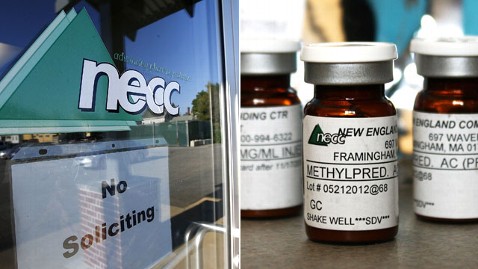Meningitis Outbreak: NECC Blames Cleaners

Credit: Minnesota Department of Health/AP Photo
The pharmacy at the heart of the fungal meningitis outbreak says a cleaning company it hired should share the blame for the tainted steroid injections that caused more than 600 illnesses in 19 states, killing 39 people.
Click here to read about the road to recovery for fungal meningitis victims.
The New England Compounding Pharmacy, which made the fungus-tainted drugs, sent a letter to UniFirst Corp., which provided once-a month cleaning services to the Framingham, Mass., lab, "demanding" it indemnify NECC for the meningitis outbreak, according to a UniFirst filing with the Securities and Exchange Commission.
"Based on its preliminary review of this matter, the company believes that NECC's claims are without merit," UniFirst wrote in its quarterly filing.
The New England Compounding Center recalled 17,000 vials of tainted steroid injections on Sept. 26 before recalling all drugs and shutting down on Oct. 6.
The Food and Drug Administration investigated NECC's lab and found that a quarter of the steroid injections in one bin contained "greenish black foreign matter," according to the report. The FDA also identified several cleanrooms that had bacterial or mold overgrowths.
UniFirst's UniClean business cleaned portions of the NECC cleanrooms to NECC's specifications and using NECC's cleansing solutions, UniFirst spokesman Adam Soreoff said in a statement. It provided two technicians once a month for about an hour and a half.
"UniClean was not in any way responsible for NECC's day-to-day operations, its overall facility cleanliness, or the integrity of the products they produced," Soreoff said. "Therefore, based on what we know, we believe any NECC claims against UniFirst or UniClean are unfounded and without merit. "
Click here for our fungal meningitis outbreak timeline, "Anatomy of an Outbreak."
NECC was not immediately available for comment.
The House of Representatives subpoenaed Barry Cadden, who owns NECC, to a hearing in Washington, D.C. on Nov. 14. He declined to testify when members of Congress pressed him on his role in ensuring that the drugs his company produced were safe and sterile.
"On advice of counsel, I respectfully decline to answer on the basis of my constitutional rights and privileges including the Fifth Amendment of the Constitution of the United States," he said at the hearing.
Members of Congress also questioned whether the FDA could have prevented the outbreak.
Compounding pharmacies, which are intended to tailor drugs to individuals with a single prescription from a single doctor, are typically overseen by state pharmacy boards rather than the FDA because they are so small. However, in 2006, the FDA issued a warning letter to NECC, accusing it of mass-producing a topical anesthetic cream, and jeopardizing another drug's sterility by repackaging it.